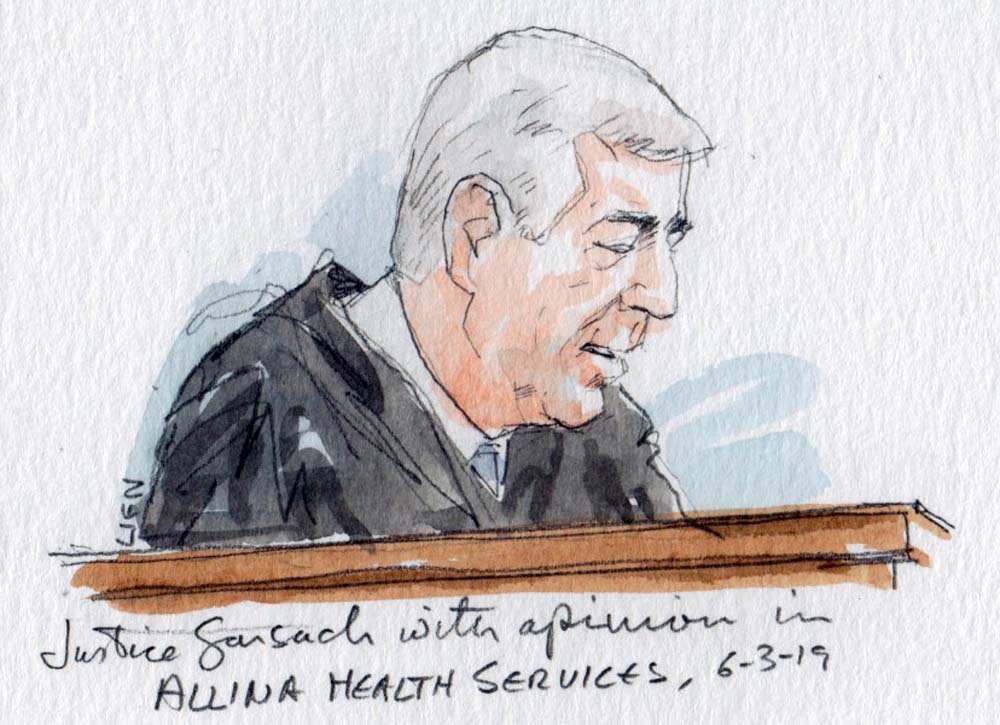Opinion analysis: Notice and comment under the Medicare Act, no big moves for the APA
on Jun 4, 2019 at 10:54 am

Administrative law folks looking for drama will be disappointed by yesterday’s 7-1 opinion in Azar v. Allina Health Services, a Medicare case that had potential wider implications for administrative law but in the end turned out to provide a bread-and-butter statutory interpretation analysis that said little about administrative law or even very much about Medicare.
The question was whether the Department of Health and Human Services was permitted to change, without notice and comment, an important reimbursement formula for hospitals that treat many low-income patients. Involving whether Medicare Part C patients should be counted along with Medicare Part A ones in the calculation, that question was worth more than $3 billion in this case alone, according to the government. Resolving the case also might have required the Supreme Court to opine on an extremely important and unresolved area of administrative law: where to draw the line between “interpretive rules,” which the Administrative Procedure Act exempts from notice and comment, and “substantive rules,” for which those procedures are normally required. HHS had claimed that the APA’s exception for interpretive rules applied to its payment change that included Part C patients in the formula. In opposition, the hospitals had argued that the APA’s substantive/interpretive divide had nothing to do with this case and that, instead, the Medicare Act’s distinctive language differs intentionally from the APA’s exemption.
The hospitals won, in an opinion by Justice Neil Gorsuch that largely echoes the textualist opinion written below by then-Judge Brett Kavanaugh, who was recused from the case. Only Justice Stephen Breyer dissented.
Determining that the “case hinges on the meaning of a single phrase in the notice-and-comment statute Congress drafted specially for Medicare in 1987,” Gorsuch focused on the language of Medicare Section 1395hh(a)(2). That section requires notice and comment for any “rule, requirement, or other statement of policy” that “establishes or changes a substantive legal standard governing … the payment for services.” The question was whether “substantive legal standard,” a phrase the Supreme Court found nowhere else in the U.S. Code, meant something different from a “substantive rule” under the APA. The hospitals had argued that a “substantive legal standard” under Medicare does not necessarily connote a “substantive rule” with the force of law, APA-style, but rather is merely a standard that “creates duties, rights and obligations,” as opposed to a “procedural” standard that sets out “how those duties, rights, and obligations should be enforced.”
Finding for the hospitals, the majority made quick work of the trickiest administrative law question in the case. Opining that “everyone agrees that a policy of counting Part C patients in the Medicare fraction is substantive in this sense, because it affects a hospital’s right to payment,” the court found no need to delve into the intricacies of what “substance” means for purposes of the APA.
In finding the Medicare Act’s exemptions from notice and comment distinct from those of the APA, the majority relied on one of the Roberts Court’s favorite textualist tools: the presumption that Congress uses words consistently across statutes and, so, when it doesn’t, the court should assume that any deviation is intentional. Here, the court noted that the Medicare Act uses the word “substantive” differently from the APA. For instance, whereas under the APA policy statements are expressly exempt from notice and comment, under the Medicare Act “statements of policy” are expressly included in the category of possible “substantive legal standards.” Moreover, whereas Congress has expressly cross-referenced or copied portions of the APA’s two exemptions from notice and comment in other statutes, in Medicare Congress expressly borrowed (through cross-reference) only one of those exemptions — the “good cause” exemption — and not also the exemption for interpretive rules. In other words, Congress has shown us it knows how to copy the APA when it wants to and, had it wished to do so here, it could have gone about it “in a much more straightforward way.”
The Supreme Court basically stopped there. It avoided making a broader ruling about how much of the lengthy Medicare operation manuals could be swept into its holding, and instead considered only the policy change before it. It likewise did not rule on two alternative arguments from the briefing: First, the court determined it had “no need to reach” the hospitals’ claim that under a different subsection of the Medicare Act “further opportunity for public comment” had to be provided because an earlier regulation on the same formula had been “struck down for not being a logical outgrowth” of the proposal. Second, the court did not even engage the government’s assertion that under 1947’s Securities and Exchange Commission v. Chenery Corp., HHS can ordinarily choose between rulemaking and adjudication for making policy decisions (and that here it had chosen the latter in posting revised payment calculations on its website).
Breyer’s dissent delved deep into the statutory history, including the extremely complicated legislative history of the Medicare language at issue — which, as he read it, pointed to Congress’ desire to copy the APA’s protections into the act. He also focused on the policy implications: “To imagine that Congress wanted the agency to use those procedures in respect to a large percentage of its Medicare guidance manuals is to believe that Congress intended to enact what could become a major roadblock to the implementation of the Medicare program.” Charging the majority with failure to “offer clarity” for Medicare’s future, Breyer argued that it still remains entirely unclear just how to determine what qualifies as a “substantive legal standard” under the act. He would have remanded the case for further proceedings on whether the change at issue was a substantive or interpretive rule under the APA.
The majority paid relatively little mind to the dissent’s concerns. It engaged the legislative history the dissent offered but found it “ambiguous at best.” It also concluded that policy concerns have little place when the statutory language is clear.
But the decision may offer two morsels of possible relevance for administrative law mavens searching for some kind of trail. Even as the majority strained to avoid jumping into the interpretive/substantive rule divide, the Supreme Court’s frustration with HHS’s form of notice here was pretty clear. With respect to the agency’s decision after the U.S. Court of Appeals for the District of Columbia Circuit had struck down its regulation that it “still wanted to count Part C patients” in determining its fiscal year 2012 payments and could not rely on a later prospective rule to do so, the Supreme Court wrote: “The agency’s solution? It posted on a website a spreadsheet announcing the 2012 Medicare fractions for 3,500 hospitals nationwide and noting that the fractions included Part C patients.” Even if prior notice and comment had not been required, the agency’s decision to use what the court called an “Internet posting” seems to have rankled the justices.
In addition, the Supreme Court briefly stepped into an open debate about the necessary length of the comment period under the APA in noting that the Medicare statute mandated “a 60-day comment period (twice the APA minimum of 30 days)” for agency actions like the one here. The APA’s text, however, requires 30 days only before most final rules can take effect. This could be a tiny, irrelevant error or the court could be wading into unresolved conflicts over whether shorter periods prevent “an opportunity to participate” under the APA.



